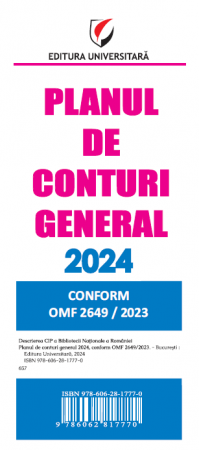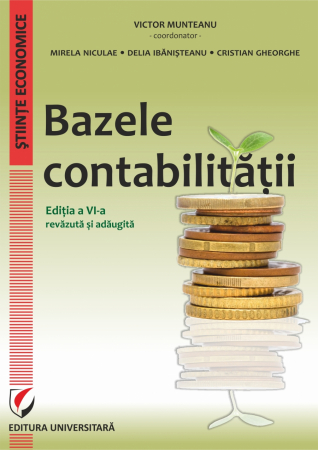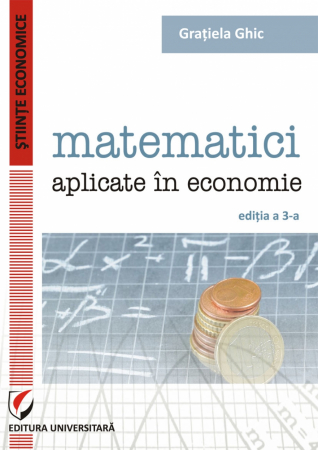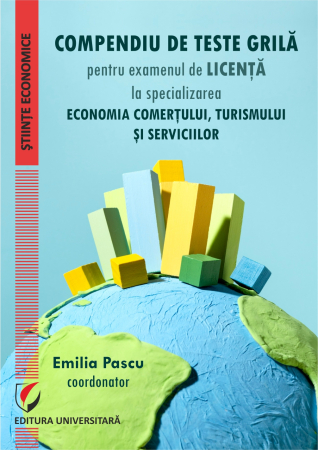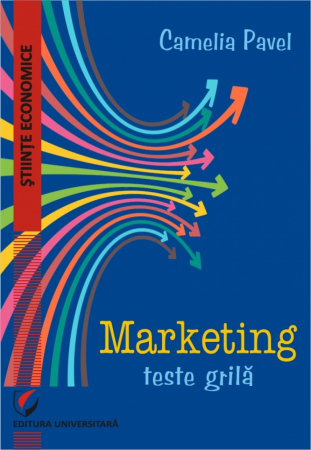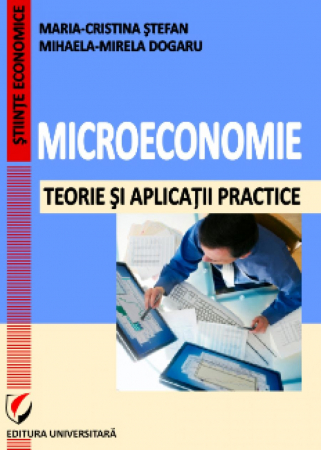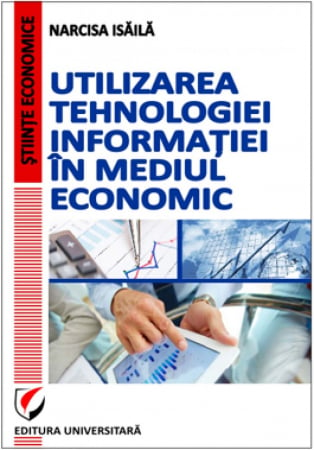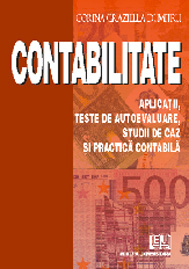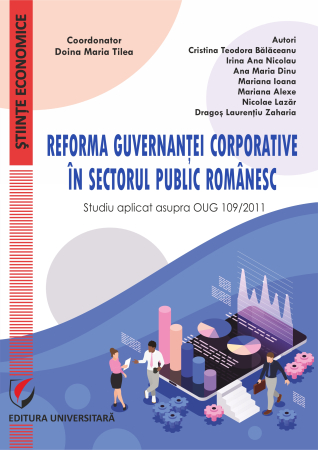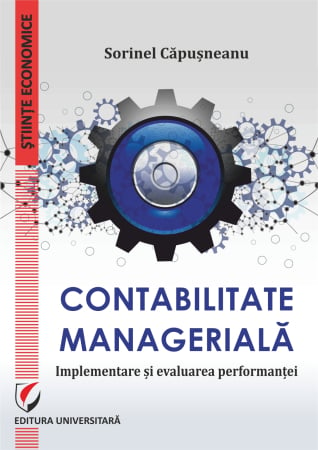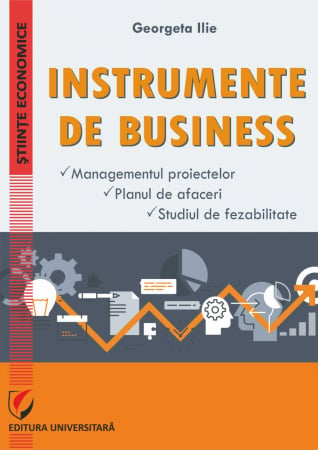6359.png) The emergence of green businesses by activating the innovative potential of economic competitiveness in the matrix of sustainable development - Victor Adrian Troaca
The emergence of green businesses by activating the innovative potential of economic competitiveness in the matrix of sustainable development - Victor Adrian Troaca
6359.png)
Publisher: Editura Universitară
Author: Victor Adrian Troaca
Edition: I
Pages: 162
Publisher year: 2023
ISBN: 978-606-28-1742-8
DOI: 10.5682/9786062817428
- Description
- Download (1)
- More details
- Content
- Reviews (0)
Innovation continues to be the key term and economic strategy of the century. Countries innovate for economic prosperity. At the same time, companies innovate for a competitive advantage. Individuals also master the science of innovation for personal and professional success. For institutions, knowledge means institutional harmony, rules, experiences and practices.
In this context, studies on innovation have shown that integration contributes to the development of companies by combining various knowledge, reducing the difference between different functional work units, such as marketing, production and research and development departments, and reducing the time to complete the project, producing superior quality products and satisfying customers more than the maximum of the needs at a given time.
In addition, the creation of the green economy based on knowledge in the whole world is very complex and can only be configured in the long term. On the other hand, both knowledge changes and innovation can be found among the new identifiers of competitive growth in the world economy, these being strengthened by the speed of dissemination of technological knowledge that is widely accepted, but being spatially limited within the global economic innovation.
At the end of 2011, the European Commission published the roadmap for energy 2050, illustrating ambitious decarbonization scenarios. A few months later, in June 2012, the Commission published a communication that underlines the crucial role that renewable energy sources will play in diversifying the EU's energy mix. In 2020, the EC also proposed ensuring the supply of green/renewable energy until 2035 and at the same time contributing to the creation of jobs, new industries and the reduction of GHG emissions as part of the same project.
On the other hand, it could be said that the EU's efforts are singular and not enough to address global environmental problems such as climate change. Investments in ecological technology will take place sooner if the global ecological innovation networks are mobilized. The EU will not always be able to compete in the production of standardized green products. It will have to maintain its strength in terms of ecological and knowledge-intensive services and technologies.
Knowledge production has become a central concern for both companies and political decision-makers. In particular, the transformation towards a "European knowledge society" has given science and technology a special importance to ensure Europe's competitiveness. Against the background of this process, the Lisbon Agenda of the European Union could be considered an attempt to reorient the main argument of Europe from one based only on economic integration to one based on the concept of a common society of knowledge.
In general, knowledge in all its forms plays a crucial role in economic processes. Nations that develop and effectively manage their knowledge assets perform better.
In the last 20 years, developed economies have shown an important increase in their spending on information and communication technologies (ICT), and there is sufficient evidence to indicate that the diffusion of ICT has contributed significantly to their productivity growth. In this context, the process of adoption, implementation and diffusion of GPT (general purpose technologies) in general and ICT in particular, is an expensive and knowledge-intensive process, the success of which depends on a company's own efforts, as well as the nature of its interactions with other firms.
The knowledge economy is a new economic paradigm, and thus the paradigm emerges while knowledge, context, process, social capital and mental production take physical form, such as raw material, labor or machinery.
Appreciating the recombinant character of the generation of technological knowledge and the essential role of external knowledge as a necessary input, allows a better appreciation of the specific quality of knowledge interactions that accompany and qualify market transactions. Knowledge interactions complete and enrich market transactions. The higher the levels of knowledge advancement of the input providers and the higher the chances that creative clients can accelerate their recombinant generation using new knowledge and accelerate their rates of introduction of new technologies.
Technological knowledge, in short technology is the set of ideas that concretize all the activities that create economic value. They can be grouped into:
Knowledge of product technologies;
Knowledge of process technologies, the specifications of all processes through which goods and services are produced;
Knowledge about organizational technologies, the specification of how the productivity activity is organized in productive and administrative units for the production of present and future goods and services (including knowledge about how to conduct research and development).
Therefore, the integration of different information that separately belongs to individuals or private units (as a result of an effort to protect knowledge or specialization) is imperative for innovation, but at the same time it allows those involved to identify the final integrated knowledge and increase the risk the loss of knowledge and the potential loss of competitive advantage.
On the other hand, government programs can rely on technological innovation to increase the quality of goods produced. However, this introduces another type of market failure, because the distribution of production costs is not efficient.
In short, improving knowledge governance in companies and groups of companies becomes a key issue. Policies must "open the borders" between: traditional fields of political intervention, traditionally defined industries, various forms of production and dissemination of knowledge, More efficiency created through policy packages rather than isolated instruments. The mix of policies and, ultimately, demand-oriented innovation policies can be taken into account, respectively the aggregation in a set of public measures to induce innovations and / or accelerate the diffusion of innovations by increasing the demand for innovations, defining a new requirement functional for products and services.
-
The emergence of green businesses by activating the innovative potential of economic competitiveness in the matrix of sustainable development - Victor Adrian Troaca
Download
Innovation continues to be the key term and economic strategy of the century. Countries innovate for economic prosperity. At the same time, companies innovate for a competitive advantage. Individuals also master the science of innovation for personal and professional success. For institutions, knowledge means institutional harmony, rules, experiences and practices.
In this context, studies on innovation have shown that integration contributes to the development of companies by combining various knowledge, reducing the difference between different functional work units, such as marketing, production and research and development departments, and reducing the time to complete the project, producing superior quality products and satisfying customers more than the maximum of the needs at a given time.
In addition, the creation of the green economy based on knowledge in the whole world is very complex and can only be configured in the long term. On the other hand, both knowledge changes and innovation can be found among the new identifiers of competitive growth in the world economy, these being strengthened by the speed of dissemination of technological knowledge that is widely accepted, but being spatially limited within the global economic innovation.
At the end of 2011, the European Commission published the roadmap for energy 2050, illustrating ambitious decarbonization scenarios. A few months later, in June 2012, the Commission published a communication that underlines the crucial role that renewable energy sources will play in diversifying the EU's energy mix. In 2020, the EC also proposed ensuring the supply of green/renewable energy until 2035 and at the same time contributing to the creation of jobs, new industries and the reduction of GHG emissions as part of the same project.
On the other hand, it could be said that the EU's efforts are singular and not enough to address global environmental problems such as climate change. Investments in ecological technology will take place sooner if the global ecological innovation networks are mobilized. The EU will not always be able to compete in the production of standardized green products. It will have to maintain its strength in terms of ecological and knowledge-intensive services and technologies.
Knowledge production has become a central concern for both companies and political decision-makers. In particular, the transformation towards a "European knowledge society" has given science and technology a special importance to ensure Europe's competitiveness. Against the background of this process, the Lisbon Agenda of the European Union could be considered an attempt to reorient the main argument of Europe from one based only on economic integration to one based on the concept of a common society of knowledge.
In general, knowledge in all its forms plays a crucial role in economic processes. Nations that develop and effectively manage their knowledge assets perform better.
In the last 20 years, developed economies have shown an important increase in their spending on information and communication technologies (ICT), and there is sufficient evidence to indicate that the diffusion of ICT has contributed significantly to their productivity growth. In this context, the process of adoption, implementation and diffusion of GPT (general purpose technologies) in general and ICT in particular, is an expensive and knowledge-intensive process, the success of which depends on a company's own efforts, as well as the nature of its interactions with other firms.
The knowledge economy is a new economic paradigm, and thus the paradigm emerges while knowledge, context, process, social capital and mental production take physical form, such as raw material, labor or machinery.
Appreciating the recombinant character of the generation of technological knowledge and the essential role of external knowledge as a necessary input, allows a better appreciation of the specific quality of knowledge interactions that accompany and qualify market transactions. Knowledge interactions complete and enrich market transactions. The higher the levels of knowledge advancement of the input providers and the higher the chances that creative clients can accelerate their recombinant generation using new knowledge and accelerate their rates of introduction of new technologies.
Technological knowledge, in short technology is the set of ideas that concretize all the activities that create economic value. They can be grouped into:
Knowledge of product technologies;
Knowledge of process technologies, the specifications of all processes through which goods and services are produced;
Knowledge about organizational technologies, the specification of how the productivity activity is organized in productive and administrative units for the production of present and future goods and services (including knowledge about how to conduct research and development).
Therefore, the integration of different information that separately belongs to individuals or private units (as a result of an effort to protect knowledge or specialization) is imperative for innovation, but at the same time it allows those involved to identify the final integrated knowledge and increase the risk the loss of knowledge and the potential loss of competitive advantage.
On the other hand, government programs can rely on technological innovation to increase the quality of goods produced. However, this introduces another type of market failure, because the distribution of production costs is not efficient.
In short, improving knowledge governance in companies and groups of companies becomes a key issue. Policies must "open the borders" between: traditional fields of political intervention, traditionally defined industries, various forms of production and dissemination of knowledge, More efficiency created through policy packages rather than isolated instruments. The mix of policies and, ultimately, demand-oriented innovation policies can be taken into account, respectively the aggregation in a set of public measures to induce innovations and / or accelerate the diffusion of innovations by increasing the demand for innovations, defining a new requirement functional for products and services.
CHAPTER 1. THE IMPORTANCE OF GREEN BUSINESS IN THE CONTEXT OF THE GROWING DEGREE OF INCIDENCE OF NATURAL HAZARDS WITH DIRECT IMPACT AT THE GLOBAL LEVEL / 15
1.1. HISTORICAL LANDMARKS AND THE UNDERSTANDING OF WELFARE AS THE FOUNDATION OF SUSTAINABLE DEVELOPMENT AND INITIATOR OF THE GREEN ECONOMY / 15
1.1.1. The theory and inefficiency of GDP and national accounts / 20
1.1.2. Measurement error and methodological problems of GDP / 23
1.2. GENERATED EXTERNALITIES, DEPLETION OF NATURAL RESOURCES AND SUSTAINABILITY AS DEFINING ELEMENTS OF GREEN BUSINESSES / 25
1.2.1. Alternative measures of economic progress and well-being / 26
1.2.2. Ecological governance and influencing the environment / 29
1.3. UNBALANCED GLOBALIZATION AND THE EMERGENCE OF SUSTAINABLE BUSINESS / 40
1.3.1. Polarization of the environment – side effect of globalization / 41
1.3.2. Globalization and the evolution of environmental costs / 46
CHAPTER 2. ACTIVATING THE INNOVATIVE POTENTIAL TO INCREASE THE COMPETITIVENESS OF GREEN BUSINESSES / 53
2.1. GREEN OR SUSTAINABLE BUSINESS – A MAINSTREAM CONCEPT / 55
2.2. THE RELATIONSHIP BETWEEN INNOVATION AND COMPETITIVENESS IN SUSTAINABLE BUSINESS / 60
2.2.1. Standardized innovation and environmental innovation / 62
2.2.2. Understanding business model innovation created for sustainability / 67
2.2.3. Value networks and mutuality of interested parties / 71
2.3. THE MICROECONOMIC PERSPECTIVE ON THE USE OF INNOVATION FOR SUSTAINABLE ECONOMIC GROWTH (EXAMPLES OF GOOD PRACTICES) / 75
2.3.1. Evaluation of the impact of sustainable business models / 76
2.3.2. Sustainable production and consumption achieved through innovation / 79
2.3.3. Connecting sustainable innovations to business models / 82
CHAPTER 3. STRATEGIC OPTIONS FOR SUSTAINABLE ECONOMIC DEVELOPMENT AT THE NATIONAL LEVEL / 88
3.1. DEVELOPMENT OF A COUNTRY IN A SUSTAINABLE FORM – FUNDAMENTAL MARKERS / 89
3.1.1. The evolution of prices as a mechanism for signaling sustainability / 90
3.1.2. The limits of sustainability – the concept of nature in the works of Marx / 95
3.2. HEATING AND OVERHEATING OF A NATIONAL ECONOMY / 100
3.2.1. The experience of the EU member states / 102
3.2.2. Overheating an economy / 109
3.3. ACHIEVING OUTPUT POTENTIAL IN A SUSTAINABLE WAY / 111
3.3.1. Industrial innovation on nature / 111
3.3.2. The use of economic and financial resources to target potential output / 120
CONCLUSIONS AND PROPOSALS / 124
BIBLIOGRAPHY / 134

![The emergence of green businesses by activating the innovative potential of economic competitiveness in the matrix of sustainable development - Victor Adrian Troaca [1] The emergence of green businesses by activating the innovative potential of economic competitiveness in the matrix of sustainable development - Victor Adrian Troaca [1]](https://gomagcdn.ro/domains/editurauniversitara.ro/files/product/large/emergenta-afacerilor-verzi-prin-activarea-potentialului-inovativ-al-competitivitatii-economice-in-matricea-dezvoltarii-durabile-victor-adrian-troaca-830588.jpg)
